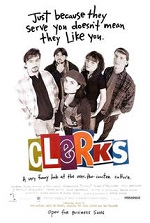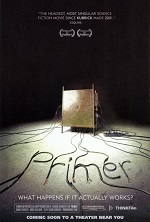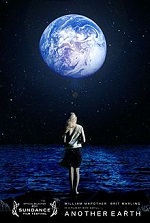"A designer knows he has reached perfection not when there is nothing left to add, but when there is nothing left to take away."
-- Antoine de Saint-Exupery
-- Antoine de Saint-Exupery
 Shot for $28,000
Shot for $28,000 The death of the B movie came slowly and quietly and was barely mourned. From its ashes rose the phoenix of independent film (obviously as a technical term, there had always been independent film, but as a genre term, interchangeable with "arthouse film" is what I mean here). Almost the polar opposite of B movies, independent film, by and large, is meant to provoke thought; to perhaps not leave you thinking about the events that transpired on screen, but about the ideas and feelings they left you with. Where B movies were completely about entertainment for the time the projector was rolling, independent film is all about resonating the most and longest after you've left the theater. It is the Filet Mignon to the B movie's potato chip. Apart from directors like Robert Rodriguez whose simultaneous mastery of and insistence on producing B movies is impressive, almost all the low-budget pictures now are much more artistic affairs than the sort that Roger Corman produced. While the definition of a B movie still technically holds true for most independent movies based on their budgets, the subject matter of monsters and superheroes have crossed over to the major studios. Movies like Godzilla now cost $165 million, significantly more than a man in a rubber suit, while the heady, sophisticated plots that used to be reserved for studio fare like North by Northwest are now much more the domain of independent filmmakers save the occasional Inception or Solaris.
 Also Made for $7000
Also Made for $7000 Studios realized - thanks to movies like Jaws and Star Wars - that the only thing stopping creature features and campy sci-fi from being mainstream hits was their typical-at-the-time shoestring budgets. In just four years, from 1976 to 1980, the average movie budget more than doubled from $4 million to $8.5 million (today it stands at about $65 million). Suddenly, nobody wanted to see the low budget fare that independent film had thrived on. The industry responded by shifting, becoming something of a creative proving ground for filmmakers to earn their stripes. Nowadays, filmmakers like Christopher Nolan have to make Memento before they're able to make Batman Begins, while some filmmakers just reap the benefits the larger budgets offer while still staying true to the type of movie that got them success, for instance, the Coen brothers with Blood Simple featuring many of the elements later found in Fargo or No Country for Old Men. What this has resulted in is a distilling of thought-provoking movies down to their most basic elements. Even North by Northwest had its crop duster scene, but now filmmakers have to make due with shoestring budgets and cannot afford that sort of action sequence (with exceptions like the $500,000 Monsters, a much better movie than its title belies).
 Made for $200,000
Made for $200,000 This has created a sort of arms race with only the highest of the high concepts as the victors. It is a genre unique enough to almost be as separate from movies as television. Primer is so notoriously obscure that fairly complex diagrams are almost a necessity to understand its plot (I'm not being facetious). Another Earth uses its sci-fi concept - the discovery of a planet identical to Earth right down to its inhabitants - only as the backdrop for the compelling story of two very damaged people and their relationship, and returns to it just for the haunting conclusion. The point of this Rant is less of my normal soapboxing, and more of a Public Service Announcement. Find out where your closest arthouse theater is. Pay attention to its offerings and patronize it at least once a year (not during Oscar-season, when mainstream fare parading as independent like Dallas Buyer's Club is shown so they can keep the lights on). Odds are, if you choose wisely (not hard to do, given critical aggregate sites like Rotten Tomatoes and Metacritic), you'll see an up-and-coming filmmaker at their most genuinely creative. Before they have to listen to studio executives and test audiences, when they can put their mental image onto the screen as faithfully as their meager budget allows. Mentioning Monsters and Godzilla in the same article was no coincidence: they're both directed by Gareth Edwards. Only now, if you've seen his independent ticket into Hollywood, you'll feel like a member of some secret club when you see similar flourishes on the screen in blockbuster glory.

 RSS Feed
RSS Feed